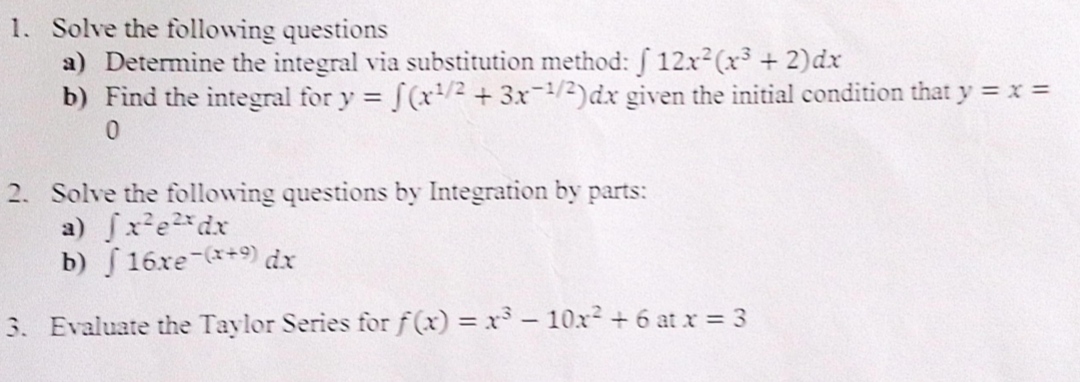1. Solve the following questions: a) Determine the integral via substitution method: ∫ 12x²(x³ + 2)dx b) Find the integral for y = ∫ (x^(1/2) + 3x^(-1/2))dx given the initial condi... 1. Solve the following questions: a) Determine the integral via substitution method: ∫ 12x²(x³ + 2)dx b) Find the integral for y = ∫ (x^(1/2) + 3x^(-1/2))dx given the initial condition that y = x = 0 2. Solve the following questions by integration by parts: a) ∫ x²e^(2x)dx b) ∫ 16xe^(-x^9)dx 3. Evaluate the Taylor Series for f(x) = x³ - 10x² + 6 at x = 3.

Understand the Problem
The question contains multiple problems related to calculus, specifically involving integration and Taylor series. The first part asks for integrals using substitution, while the second part requires integration by parts. The final part deals with evaluating the Taylor series for a polynomial function.
Answer
1. a) \( 2(x^3 + 2)^2 - 8(x^3 + 2) + C \), b) \( y = \frac{2}{3}x^{3/2} + 6x^{1/2} \) 2. a) Needs continuing integration by parts, b) \( -\frac{16}{9} e^{-x^9} + C \) 3. Taylor Series: \( -3 - 33(x - 3) - (x - 3)^2 + \cdots \)
Answer for screen readers
-
a) ( 2(x^3 + 2)^2 - 8(x^3 + 2) + C )
b) ( y = \frac{2}{3}x^{3/2} + 6x^{1/2} )
-
a) Integral needs ( \frac{1}{2}x^2 e^{2x} + \text{remaining terms} )
b) ( -\frac{16}{9} e^{-x^9} + C )
-
Taylor Series: ( -3 - 33(x - 3) - (x - 3)^2 + \cdots )
Steps to Solve
-
Integral via Substitution for a) ∫ 12x²(x³ + 2)dx
We can use substitution. Let ( u = x^3 + 2 ). Then, the derivative ( du = 3x^2 dx ) or ( \frac{du}{3} = x^2 dx ).
Substituting, we get: $$ \int 12x^2(x^3 + 2)dx = \int 12(u - 2) \cdot \frac{du}{3} $$ Simplifying gives: $$ = 4 \int (u - 2) du $$ Now, integrate: $$ = 4\left(\frac{u^2}{2} - 2u\right) + C = 2u^2 - 8u + C $$ Substituting back ( u ): $$ = 2(x^3 + 2)^2 - 8(x^3 + 2) + C $$
-
Integral for b) y = ∫ (x^(1/2) + 3x^(-1/2))dx
This can be integrated directly: $$ y = \int x^{1/2}dx + \int 3x^{-1/2}dx $$ For ( x^{1/2} ): $$ = \frac{x^{3/2}}{3/2} = \frac{2}{3}x^{3/2} $$ For ( 3x^{-1/2} ): $$ = 3 \cdot 2x^{1/2} = 6x^{1/2} $$ So, we have: $$ y = \frac{2}{3}x^{3/2} + 6x^{1/2} + C $$ Given ( y(0) = 0 ), we find ( C = 0 ). Thus: $$ y = \frac{2}{3}x^{3/2} + 6x^{1/2} $$
-
Integral via Integration by Parts for a) ∫ x²e^(2x)dx
Use integration by parts, letting ( u = x^2 ) and ( dv = e^{2x}dx ). Then ( du = 2xdx ) and ( v = \frac{1}{2}e^{2x} ). Applying the integration by parts formula: $$ \int u , dv = uv - \int v , du $$ We get: $$ \int x^2 e^{2x} dx = x^2 \cdot \frac{1}{2}e^{2x} - \int \frac{1}{2}e^{2x} \cdot 2x dx $$ This simplifies to: $$ = \frac{1}{2}x^2 e^{2x} - \int x e^{2x} dx $$ Use integration by parts again for ( \int x e^{2x} dx ).
-
Integral for b) ∫ 16xe^(-x^9)dx
Using substitution ( u = -x^9 ), then ( du = -9x^8dx \Rightarrow dx = \frac{du}{-9x^8} ). Thus: $$ \int 16xe^{-x^9}dx = -\frac{16}{9} \int e^u du = -\frac{16}{9} e^{-x^9} + C $$
-
Evaluate the Taylor Series for f(x) = x³ - 10x² + 6 at x = 3
The Taylor series around ( a = 3 ) is: $$ f(3) + f'(3)(x - 3) + \frac{f''(3)}{2!}(x - 3)^2 + \cdots $$ Calculate:
- ( f(3) = 3^3 - 10(3^2) + 6 = -3 )
- ( f'(x) = 3x^2 - 20x \Rightarrow f'(3) = 3(9) - 60 = -33 )
- ( f''(x) = 6x - 20 \Rightarrow f''(3) = 6(3) - 20 = -2 ) Substitute into Taylor series: $$ = -3 - 33(x - 3) - \frac{2}{2}(x - 3)^2 + \cdots $$
-
a) ( 2(x^3 + 2)^2 - 8(x^3 + 2) + C )
b) ( y = \frac{2}{3}x^{3/2} + 6x^{1/2} )
-
a) Integral needs ( \frac{1}{2}x^2 e^{2x} + \text{remaining terms} )
b) ( -\frac{16}{9} e^{-x^9} + C )
-
Taylor Series: ( -3 - 33(x - 3) - (x - 3)^2 + \cdots )
More Information
The integrals illustrate fundamental techniques in calculus such as substitution and integration by parts. The Taylor series provides a polynomial approximation of a function around a specific point.
Tips
- Forgetting to substitute back when using substitution.
- Not applying the integration by parts formula correctly.
- Miscalculating derivatives when evaluating Taylor series.
AI-generated content may contain errors. Please verify critical information